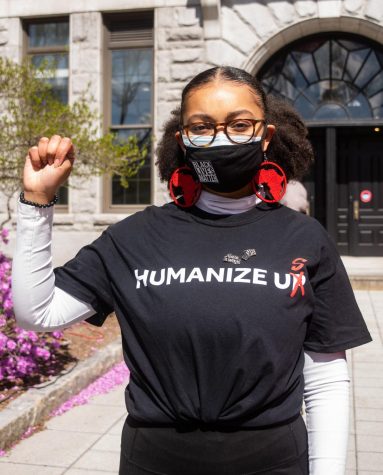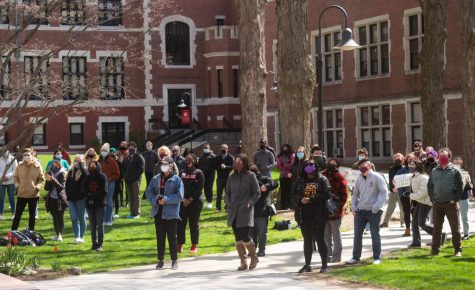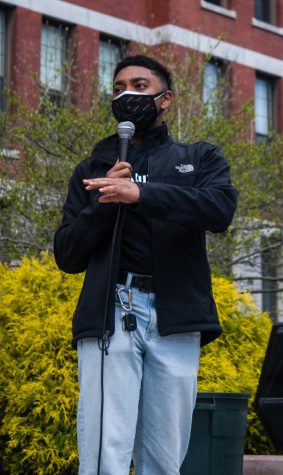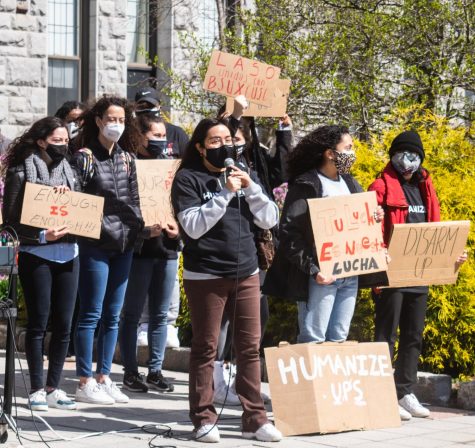Community, Rage and Resistance: The Black Student Union x Student Council Rally to Fight On-Campus Racism
April 30, 2021

“Your silence right now might as well call me a slur,” Eunice Dollete (‘21) – president of the Clark Undergraduate Student Council – exclaimed at the BSU/CUSC rally last Friday, April 23, reminding us of the importance of speaking up for racial issues that extend beyond our own. Eunice’s powerful poem – a love letter to all those involved in academia – was enraged, sometimes exhausted, but mostly cathartic in its ability to relate to much of Clark University’s BIPOC student body.
The speech also had its tender moments, as Dollete emphasized the importance of resting and of taking care of each other as a community. Their duality between anger and softness characterized the entirety of the rally, suggesting that these two emotions may not be so removed from each other after all. These emotions are both rooted in care and the need for this care to extend to every member of the Clark community. Students are angry because they know they need and deserve better care, whether it is in the form of the BSU’s demands being met or a professor providing students with accomodations for an assignment in light of the numerous tragedies that plague our planet every single day.

Like Eunice, numerous students took to the stage and expressed the marginalization and hurt they have experienced on Clark’scampus and beyond. Ahiela Watson (‘21), the current president of the BSU, outlined why police disarmament is important, bringing our attention to the fact that Clark University is one of the few campuses in Massachusetts where the University police department is still armed despite Clark’s relatively small size. Watson emphasized that it is Black people that are constantly racially profiled and stereotyped by those in authority and University Police.
The rally also included Clark students and faculty speaking out about or in response to discrimination they’d faced on campus. An international student recounted a time in one of her political science courses – it should be noted that Political Science is this student’s major – where the professor was oblivious to the flag of Pakistan, her home country, confusing it for the flag of an international terrorist organization. She expressed how disheartened she felt afterwards and how she almost dropped all her political science courses, feeling unseen and unheard. It was the community of people – the students – she had encountered along her journey that encouraged her to stay.
Grace Williams, the first-year representative for the BSU, addressed her peers directly, posing the important (and perhaps the most difficult) question: “Do any more white people deserve to see me vulnerable? Are they trying to hear or just listen?” She outlined the importance of love in activism, how it can enlighten and empower us but how love is often not extended to the Black community, and how, if it was, it could prove to be transformative.

Elliot Anderson (‘22) spoke another important truth – that there simply were not enough students out on the Square that day and more work needed to be done for change to be seen. More students need to demonstrate that they care about their fellow peers of color. Only then will the Clark administration react to our stories and experiences.
As more students got up and spoke up from a personal and vulnerable place, it became increasingly clear that students are tired of superficial emails from the Clark administration that do not directly address the root of their concerns. Clark students want real empathy. They need real change. They need earnest dialogue and want their allies to act.
The electric atmosphere, buzzing excitement, and emotional catharsis of the rally, can only be attributed to the BSU and CUSC’s painstaking and tireless efforts to create lasting changes on campus. Both student groups have shown the Clark University student body what a true community can look like, what it can achieve, and what it deserves. It is up to us to follow suit with positive and transformative changes that should ultimately honor the experiences and voices of BIPOC students at Clark and beyond our campus.

